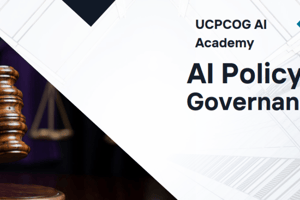Podcast
Questions and Answers
What aspect of AI governance does not relate to ethical considerations?
What aspect of AI governance does not relate to ethical considerations?
- ISO and IEEE compliance standards
- AI and Corporate Social Responsibility
- Building ethical AI systems
- AI Risk Management in Organizations (correct)
Which of the following best describes the role of regulatory sandboxes in AI?
Which of the following best describes the role of regulatory sandboxes in AI?
- To provide a controlled environment for testing AI technologies (correct)
- To completely bypass compliance requirements for AI
- To enforce stringent regulations on AI startups
- To eliminate all risks associated with AI deployment
Which organization is involved in setting international standards for AI?
Which organization is involved in setting international standards for AI?
- International Organization for Standardization (ISO) (correct)
- International Monetary Fund (IMF)
- Federal Trade Commission (FTC)
- World Health Organization (WHO)
What is a primary benefit of AI in organizational risk management?
What is a primary benefit of AI in organizational risk management?
What is a critical trend in the future of AI ethics and governance?
What is a critical trend in the future of AI ethics and governance?
Which of the following is a practical approach to manage AI risks in organizations?
Which of the following is a practical approach to manage AI risks in organizations?
What is a key aspect of AI and corporate social responsibility?
What is a key aspect of AI and corporate social responsibility?
What role do regulatory sandboxes serve in AI development?
What role do regulatory sandboxes serve in AI development?
Which organization is known for setting international standards relevant to AI?
Which organization is known for setting international standards relevant to AI?
How can AI enhance organizational risk management?
How can AI enhance organizational risk management?
Flashcards are hidden until you start studying
Study Notes
Building Ethical AI Systems: Best Practices and Case Studies
- Emphasizes the importance of ethical considerations in the development of AI systems.
- Encourages transparency, accountability, and fairness as foundational principles.
- Highlights case studies that successfully integrate ethical AI practices.
Governance of AI in Practice: Industry Case Studies
- Illustrates how various industries implement AI governance frameworks.
- Provides examples of companies establishing clear policies on AI use.
- Discusses the impact of governance on operational efficiency and risk mitigation.
AI and Corporate Social Responsibility: Ethical Considerations
- Examines the intersection of AI implementation and corporate social responsibility (CSR).
- Explores how AI technologies can support sustainable practices and societal welfare.
- Addresses potential ethical dilemmas presented by AI deployment in business.
Practical Approaches to AI Risk Management in Organizations
- Focuses on establishing a risk management framework tailored for AI systems.
- Identifies common risks associated with AI, including bias, privacy, and system failures.
- Recommends continuous monitoring and assessment strategies for AI-related risks.
International Standards for AI Compliance: ISO and IEEE
- Details the role of ISO and IEEE in setting international standards for AI.
- Ensures compliance with legal, ethical, and safety requirements globally.
- Promotes interoperability and best practices across different AI deployments.
The Role of AI in Enhancing Organizational Risk Management
- Outlines how AI tools improve risk identification and analysis in businesses.
- Discusses predictive analytics capabilities of AI in forecasting potential risks.
- Supports decision-making processes by providing data-driven insights.
The Role of AI in Cybersecurity: Governance and Compliance
- Explains how AI strengthens cybersecurity measures and threat detection.
- Discusses compliance challenges associated with AI in cybersecurity.
- Highlights regulatory requirements specific to AI-driven security solutions.
Regulatory Sandboxes for AI: Global Examples and Best Practices
- Introduces regulatory sandboxes as a testing environment for new AI applications.
- Provides examples from different countries that foster innovation while ensuring compliance.
- Encourages collaboration between regulators and technology developers.
Preparing for Professional Certification in AI Governance and Compliance
- Outlines key competencies required for certification in AI governance.
- Highlights the importance of understanding ethical frameworks and technical standards.
- Recommends resources and study guides for aspiring professionals in the field.
The Future of AI Ethics and Governance: Predictions and Trends
- Explores emerging trends in AI ethics, including increased regulatory scrutiny.
- Predicts a growing emphasis on ethical AI frameworks as standards evolve.
- Discusses the potential impact of AI on global governance and societal norms.
Building Ethical AI Systems: Best Practices and Case Studies
- Emphasizes the importance of ethical considerations in the development of AI systems.
- Encourages transparency, accountability, and fairness as foundational principles.
- Highlights case studies that successfully integrate ethical AI practices.
Governance of AI in Practice: Industry Case Studies
- Illustrates how various industries implement AI governance frameworks.
- Provides examples of companies establishing clear policies on AI use.
- Discusses the impact of governance on operational efficiency and risk mitigation.
AI and Corporate Social Responsibility: Ethical Considerations
- Examines the intersection of AI implementation and corporate social responsibility (CSR).
- Explores how AI technologies can support sustainable practices and societal welfare.
- Addresses potential ethical dilemmas presented by AI deployment in business.
Practical Approaches to AI Risk Management in Organizations
- Focuses on establishing a risk management framework tailored for AI systems.
- Identifies common risks associated with AI, including bias, privacy, and system failures.
- Recommends continuous monitoring and assessment strategies for AI-related risks.
International Standards for AI Compliance: ISO and IEEE
- Details the role of ISO and IEEE in setting international standards for AI.
- Ensures compliance with legal, ethical, and safety requirements globally.
- Promotes interoperability and best practices across different AI deployments.
The Role of AI in Enhancing Organizational Risk Management
- Outlines how AI tools improve risk identification and analysis in businesses.
- Discusses predictive analytics capabilities of AI in forecasting potential risks.
- Supports decision-making processes by providing data-driven insights.
The Role of AI in Cybersecurity: Governance and Compliance
- Explains how AI strengthens cybersecurity measures and threat detection.
- Discusses compliance challenges associated with AI in cybersecurity.
- Highlights regulatory requirements specific to AI-driven security solutions.
Regulatory Sandboxes for AI: Global Examples and Best Practices
- Introduces regulatory sandboxes as a testing environment for new AI applications.
- Provides examples from different countries that foster innovation while ensuring compliance.
- Encourages collaboration between regulators and technology developers.
Preparing for Professional Certification in AI Governance and Compliance
- Outlines key competencies required for certification in AI governance.
- Highlights the importance of understanding ethical frameworks and technical standards.
- Recommends resources and study guides for aspiring professionals in the field.
The Future of AI Ethics and Governance: Predictions and Trends
- Explores emerging trends in AI ethics, including increased regulatory scrutiny.
- Predicts a growing emphasis on ethical AI frameworks as standards evolve.
- Discusses the potential impact of AI on global governance and societal norms.
Studying That Suits You
Use AI to generate personalized quizzes and flashcards to suit your learning preferences.




